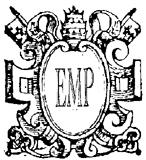other
EMP1641
Croce, Giovanni
Resonent organa
SATTB (+SATB) bc
Christmas
£8.00
EMP0853
Croce, Giovanni
Sit nomen Domini benedictum
ATB (+SATB) bc
Holy Name of Jesus (Sunday between Jan. 1 and Epiphany)
£4.00
EMP1138
Croce, Giovanni
Sit nomen Domini benedictum
ATB (+SATB) bc
Holy Name of Jesus (Sunday between Jan. 1 and Epiphany)
£4.00
EMP1621
Croce, Giovanni
Sit nomen Domini benedictum
ATB (+SATB) bc
Holy Name of Jesus (Sunday between Jan. 1 and Epiphany)
£3.00
EMP1635
Croce, Giovanni
Sit nomen Domini benedictum
ATB (+SATB) bc
Holy Name of Jesus (Sunday between Jan. 1 and Epiphany)
£8.00
EMP0944
Croce, Giovanni
Tres sunt qui testimonium
SATTBB (+SATB) bc
Marian Feasts
£4.75
EMP1629
Croce, Giovanni
Tres sunt qui testimonium
SATTBB (+SATB) bc
Marian Feasts
£3.00
EMP1643
Croce, Giovanni
Tres sunt qui testimonium
SATTBB (+SATB) bc
Marian Feasts
£8.00
EMP0864
Croce, Giovanni
Verbum caro factum est
SAT (+SATB) bc
Christmas
£4.00
EMP1623
Croce, Giovanni
Verbum caro factum est
SAT (+SATB) bc
Christmas
£3.00
EMP1637
Croce, Giovanni
Verbum caro factum est
SAT (+SATB) bc
Christmas
£8.00
EMP0328
Anonymous
Alma Redemptoris Mater
chant
Marian Antiphon, Advent and Christmastide (until Purification)
Chant notation (St. Meinrad)
£2.50
EMP1258
Gabrieli, Giovanni
Confitebor tibi Domine a 13 (1615)
a 13: see description
Respond, Office of the Dead
£6.30
EMP1251
Gabrieli, Giovanni
Magnificat a 14 (1615)
14 parts: see description
Vesper Canticle, General Use
£7.10
EMP1690
Gabrieli, Giovanni
Magnificat a 14 (1615)
14 parts: see description
Vesper Canticle, General Use
£13.50
EMP1278
Gabrieli, Giovanni
O quam gloriosa a 16
a 16: see description
Assumption BVM (August 15)
£6.30
EMP1249
Gabrieli, Giovanni
Omnes gentes
a 16: see description
Ascension
£6.00
EMP1285
Hassler, Hans Leo
Jubilate Deo a 15
a 15: see description
Psalm-Motet, Christmas
£6.00
EMP0574
Handl, Jakob (Gallus)
Two motets for Advent
various
Motet general, Advent
£4.00
EMP1299
Palestrina, Giovanni Pierluigi da
Lamentations III (Fri.)
various
Lesson (Lesung), Good Friday (Karfreitag)
£6.30
EMP0298
Palestrina, Giovanni Pierluigi da
Lamentations III (Sat.)
various
Lesson (Lesung), Holy Saturday (Easter Eve)(Karsamstag)
£7.10
EMP0296
Palestrina, Giovanni Pierluigi da
Lamentations III (Thur.)
various
Lesson (Lesung), In Cena Domini (Maundy Thursday, Gründonnerstag)
£7.10
EMP1148
Palestrina, Giovanni Pierluigi da
Lamentations Liber III
various
Lesson (Lesung), Holy Saturday (Easter Eve)(Karsamstag)
£.00
EMP0583
de la Rue, Pierre
Missa pro Defunctis
various
Mass Propers, Requiem
£6.00
EMP1143
Procter, Michael
Von Herzen will ich mich freuen
unison
Introitus, Conception of BVM (December 8)
£2.75
EMP0755
Wylkynson (Wilkinson), Robert
Jesus autem transiens/Credo in Deum
13 tenors
Non-liturgical
£2.50
EMP0756
Wylkynson (Wilkinson), Robert
Jesus autem transiens/Credo in Deum
13 tenors
Non-liturgical
£5.00
EMP0751
Croce, Giovanni
Missa super Jubilate Deo
Four choirs
Mass Ordinary, General Use
£18.50
EMP0757
Croce, Giovanni
Missa super Jubilate Deo
Four choirs
Mass Ordinary, General Use
£6.00
EMP0758
Croce, Giovanni
Missa super Jubilate Deo
Four choirs
Mass Ordinary, General Use
£6.00
EMP0759
Croce, Giovanni
Missa super Jubilate Deo
Four choirs
Mass Ordinary, General Use
£6.00
EMP0760
Croce, Giovanni
Missa super Jubilate Deo
Four choirs
Mass Ordinary, General Use
£6.00
EMP0761
Croce, Giovanni
Missa super Jubilate Deo
Four choirs
Mass Ordinary, General Use
£48.50
EMP1274
Gabrieli, Giovanni
Exaudi me Domine a 16 (1615)
Four choirs
Respond, Office of the Dead
£6.00


